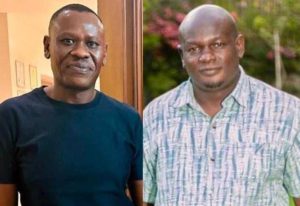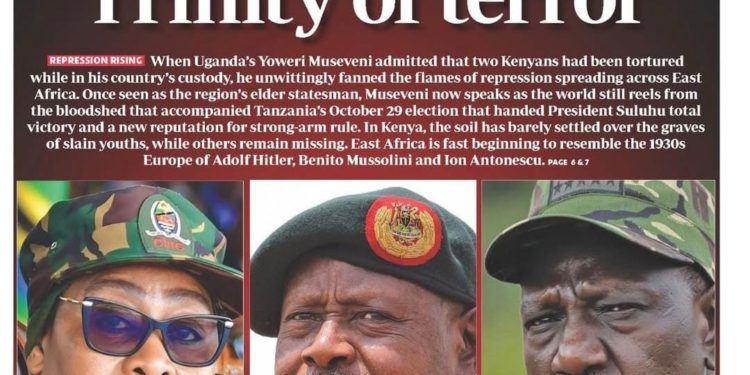This morning, Kenya’s renowned Standard newspaper published a striking headline: “Trinity of Terror.” The phrase captures three connected political crises. These crises have placed East Africa on the global radar. Moreover, they highlight serious concerns about cross-border disputes and human rights.
The “trinity” refers to three leaders and their countries. First, there’s Uganda’s President Yoweri Museveni. Second, Tanzania’s President Samia Suluhu Hassan. Third, figures within Kenya’s security system. Their recent actions have raised alarm. Specifically, concerns focus on democracy, civil liberties, and regional cooperation in East Africa.
Furthermore, these issues follow a pattern of incidents from recent months. The pattern shows detention, alleged torture, and political suppression across national borders.
The Uganda Detention: What Happened
On October 1, 2025, armed men abducted two Kenyan activists in Uganda. The activists were Bob Njagi and Nicholas Oyoo.Both are members of the Free Kenya Movement, a human rights group that focuses on political and civil rights, accountability and social justice in Kenya. They had attended a campaign rally organized by Ugandan opposition leader Robert Kyagulanyi, known as Bobi Wine.

Eyewitnesses reported a kidnapping at a petrol station in Kaliro, eastern Uganda. Men drove the activists to an unknown location.
For 38 days, no one knew where they were. Meanwhile, families, lawyers, and civil society groups demanded answers. Initially, Ugandan authorities denied holding the two activists. The Uganda People’s Defence Forces (UPDF) stated on October 22 that investigations showed the activists were not in army custody.
However, the situation changed on Saturday, November 8. President Museveni confirmed that Ugandan security forces had arrested and detained the two Kenyans. He called them “experts in riots.” Additionally, he claimed they were “working with Kyagulanyi’s group.” He used a chilling phrase: “we put them in the fridge for some days.”
The activists gained their freedom on November 8, 2025. After 38 days, authorities handed them over to Kenya’s High Commissioner in Uganda, Joash Maangi. Kenya’s Foreign Affairs Minister Musalia Mudavadi confirmed the release. It followed “sustained diplomatic engagement between Kenya and Uganda.”
Upon returning to Kenya, both activists described torture and starvation during their detention. They mentioned Kasenyi Military Barracks in Entebbe. Njagi said he didn’t eat for 14 days. Their release came after weeks of protests and legal actions. Notably, former President Uhuru Kenyatta reportedly played a key diplomatic role.
Tanzania’s October Election Violence
Tanzania held elections on October 29, 2025. President Samia Suluhu Hassan won. However, widespread violence and deadly protests marred the election. Authorities barred opposition leaders from running. For instance, Chadema party leader Tundu Lissu faced arrest and treason charges after calling for electoral reforms.
The UN human rights office reported that at least 10 demonstrators died. Security forces used firearms and tear gas against protesters. Cities affected included Dar es Salaam, Shinyanga, and Morogoro. Nevertheless, opposition sources claimed much higher casualties. Chadema alleged hundreds of deaths.
Human Rights Watch documented that authorities responded with lethal force. They imposed nationwide internet restrictions. Furthermore, they enforced a strict lockdown. The lockdown prevented residents from leaving their homes.
Tanzania travel advisory November 2025: what it means for Kenya tourism this christmas season.
Regional and international observers declared the elections did not meet democratic standards. The Southern African Development Community (SADC), European Union, and African Union all cited serious concerns. These included intimidation, restricted political participation, violence, and electoral problems. Additionally, UN Secretary-General António Guterres called for thorough investigations into excessive force allegations.
Missing Youths in Kenya
The third element of this “trinity” involves Kenyan youths who remain missing. Families and civil society groups have raised concerns about their disappearances. Consequently, these cases have increased public anxiety about state responses to dissent. They also raise questions about the protection of citizens’ rights within Kenya’s borders. Indeed, they form part of a broader regional pattern of forced disappearances and unlawful detentions.
Regional Impact and Cross-Border Concerns
This incident is not isolated. Earlier in 2025, Kenyan activist Boniface Mwangi and Ugandan journalist Agather Atuhaire faced detention in Tanzania. Authorities held them without communication. Eventually, they were abandoned at their respective national borders. There, they described brutal mistreatment. This included allegations of sexual torture. However, Tanzanian police dismissed these claims as “hearsay.”
Similarly, in November 2024, Ugandan opposition figure Kizza Besigye disappeared mysteriously in Nairobi. Four days later, he surfaced in a military court in Uganda. He faced treason charges. These cases have sparked widespread criticism. Moreover, they raise concerns that East African governments may be working together to suppress dissent across borders.
East African countries maintain deeply connected economies. Cross-border trade, labor movement, and shared infrastructure projects link them. Therefore, political instability or human rights concerns in one nation can affect investor confidence, tourism, and regional cooperation. The East African Community promotes integration among member states. It relies on mutual respect for sovereignty and citizens’ rights.
For ordinary Kenyans, these developments matter in practical ways. They affect the safety of family members working or studying abroad. Additionally, they impact the security of trade routes and the reliability of regional travel. The incidents also raise important questions. Can citizens safely engage with political movements in neighboring countries? Will they face arbitrary detention or mistreatment?
Moving Forward: Lessons and Vigilance
The release of Bob Njagi and Nicholas Oyoo represents a victory. It shows the power of diplomatic engagement and civil society activism. Faith Odhiambo, president of the Law Society of Kenya, welcomed their release. She stated: “Let this moment signal an important shift towards upholding the human rights of East Africans anywhere within the East African Community.”
However, human rights organizations remain concerned about broader patterns. Irungu Houghton, executive director of Amnesty International Kenya, issued a warning. He said that “disturbing trends in Tanzania and Uganda signal a rising threat to human rights.” These trends could affect Uganda’s 2026 and Kenya’s 2027 general elections. He called on East Africans to speak out. He noted that “oppressive regimes thrive on our silence.”
Citizens seeking information should rely on official government statements and reputable media sources. Additionally, they should follow updates from diplomatic missions. Families with concerns about detained individuals can contact the Ministry of Foreign Affairs for help. As political temperatures rise ahead of upcoming elections, maintaining accurate information becomes increasingly important. Supporting institutions that protect citizens’ rights across borders is essential.
The “Trinity of Terror” headline serves as a wake-up call. It highlights the state of civil liberties in East Africa. While the immediate crisis involving the two Kenyan activists has been resolved, broader questions remain open. These include questions about cross-border cooperation, respect for human rights, and the space for political dissent in the region.
















